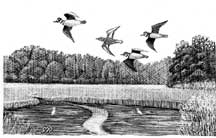|
 |
Earth Journal
by Gary Pendleton |
 Killdeer on Mudflats Killdeer on Mudflats
You can hear the killdeer. They cry out kildee-kildee-kildee in a high-pitched voice. I hear them often in the evening. Even after dark, they are common around my house in North Beach. Killdeer are an everyday kind of bird, practically a backyard bird, at least compared to other shorebirds.
To be sure, killdeer are most at home near the shore, on mud flats like the one shown here at the North Beach marsh or along the Patuxent at Jug Bay’s marshes.
But you can find them far from the coast, in meadows, fields, lawns and riverbanks, anywhere that is flat. Even in my old neighborhood, hilly Takoma Park, I would hear the killdeer and see them circling over the trees. They must have been nesting on the flat roof of the neighborhood elementary school. They will do that.
Killdeer are a kind of plover and a part of a large group that includes sandpipers, godwits and curlews, all known for their long migratory journeys. The golden plover, for example, travels thousands of miles from the Arctic tundra to Patagonia at the tip of South America.
Killdeer don’t travel so far. Here in the Mid-Atlantic, you’ll find them year round. From September until sometime in December, they are especially abundant on tidal mud flats when birds from northern areas are passing through.
The little marsh on the north edge of North Beach is one of the best spots on the Western Shore for shorebirds from late summer to early fall and again in late spring. Look for killdeer and some of their less common, more expeditious, cousins, at low tide.
|



 Killdeer on Mudflats
Killdeer on Mudflats